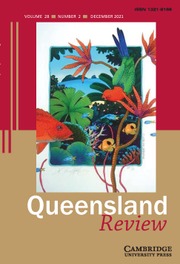Article contents
The death of Australian literature in Thea Astley’s Drylands
Published online by Cambridge University Press: 03 December 2019
Abstract
This article reads Thea Astley’s final novel in the context of rhetoric about the death of Australian literature that has been a mainstay of our national culture almost since its inception. In the early 2000s, a new round of obituarists argued that the global publishing industry, critical trends and changing educational pedagogies were eroding Australia’s literary identity. Drylands, published in 1999, can be considered a slightly prescient participant in this conversation: it is subtitled A Book for the World’s Last Reader, seemingly framing the novel in a polemics of decline. My reading, however, sees the book as the product of two correlated yet combative literary projects: the attempt by its primary narrator, Janet Deakin, to write a book after what she sees as the likely death of reading and writing; and Astley’s more nuanced exploration of the role of literature in settler colonial modernity. Reading across the seven narratives that constitute the book, I argue that Drylands performs the fraught relationship between ethics and aesthetics in the context of writing about the systemic violence of the settler colonial state, questioning literary privilege, exclusivity and complicity in ways that remain relevant to debates regarding Australian literature today.
- Type
- Articles
- Information
- Queensland Review , Volume 26 , Special Issue 2: Thea Astley special issue , December 2019 , pp. 256 - 268
- Copyright
- © The Author(s) 2019
References
- 1
- Cited by


